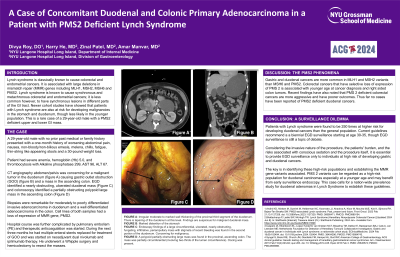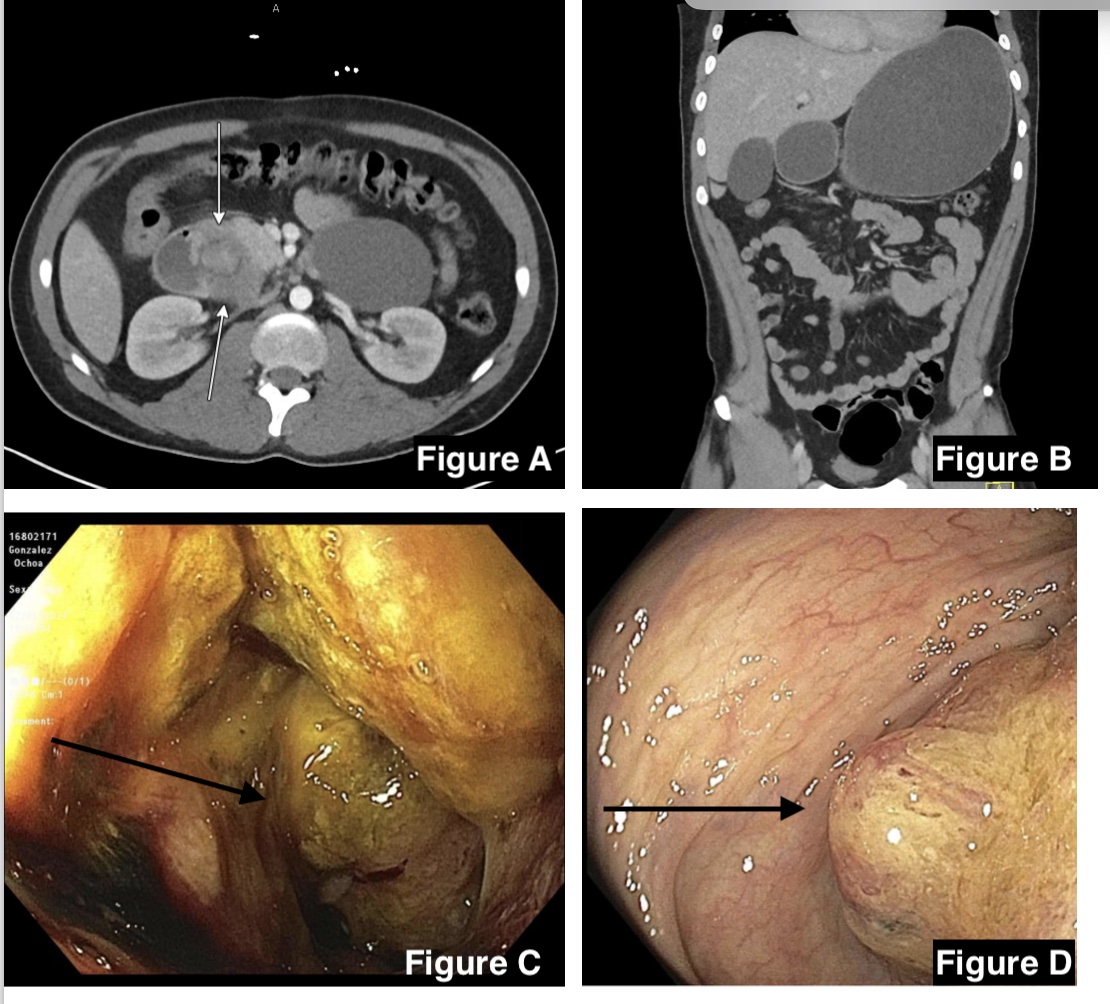Monday Poster Session
Category: Colorectal Cancer Prevention
P2168 - A Case of Concomitant Duodenal and Colonic Primary Adenocarcinoma in a Patient With PMS2 Deficient Lynch Syndrome
Monday, October 28, 2024
10:30 AM - 4:00 PM ET
Location: Exhibit Hall E

Has Audio

Divya Roy, DO
NYU Langone Health
Mineola, NY
Presenting Author(s)
Divya Roy, DO, Harry He, MD, Zinal Patel, MD, Amar Manvar, MD
NYU Langone Health, Mineola, NY
Introduction: Lynch syndrome is a germline mutation resulting in large deletions in mismatch repair (MMR) genes MLH1, MSH2, MSH6 and PMS2. It is the most common form of genetically inherited colon cancer and patients have an 80% increased lifetime risk of developing colorectal cancer. In newer cohort studies, patients with Lynch syndrome are also at risk for developing malignancies in the stomach and duodenum, though less likely in the younger population. This is a case of a 29 year old male with an PMS2 deficient upper and lower GI mass.
Case Description/Methods: A 29 year old male with no known past medical and family history presented to the ED with a 1 month history of 30lb weight loss, worsening abdominal pain with nausea, emesis, and melana. WBC was 16.5, Hb 5, and platelets were 743 to 1,056 during the course of admission. Liver function tests remarkable for an elevated alkaline phosphatase of 743. CT angiography of the abdomen showed irregular wall thickening in the duodenum (figure A), highly suspicious for malignancy, with marked distention of stomach concerning (figure B), and an ascending colonic mass.
EGD showed gastric outlet obstruction and demonstrated the duodenal mass (figure C). Hospital course was complicated by pulmonary embolism for which anticoagulation was started. Given high risk for surgery, a 22 mm X 9 cm Wallflex duodenal stent was placed to help alleviate outlet obstruction. Patient had a colonoscopy that showed a malignant appearing tumor in the proximal ascending colon (figure D).
Biopsies from the duodenum and colon had cell lines deficient in PMS2. The duodenal mass was an invasive adenocarcinoma moderately to poorly differentiated. The colonic mass was a well differentiated adenocarcinoma, respectively. He was started on immunotherapy. After 3 months of uninterrupted anticoagulant therapy, he underwent a Whipple surgery and hemi-colectomy.
Discussion: This is a rare presentation of PMS2 deficient Lynch syndrome with synchronous duodenal and colonic adenocarcinoma. Gastric and duodenal cancers are common in MLH1 and MSH2 deficient Lynch syndrome in older populations and are identified as high risk populations. There are no cases reported with PMS2 variants with duodenal masses.
This case underscores the need for endoscopic surveillance strategies for duodenal cancers in Lynch syndrome. Because duodenal carcinomas are rare in Lynch syndrome, the prevalence data about its precursor lesion, duodenal adenoma is lacking.

Disclosures:
Divya Roy, DO, Harry He, MD, Zinal Patel, MD, Amar Manvar, MD. P2168 - A Case of Concomitant Duodenal and Colonic Primary Adenocarcinoma in a Patient With PMS2 Deficient Lynch Syndrome, ACG 2024 Annual Scientific Meeting Abstracts. Philadelphia, PA: American College of Gastroenterology.
NYU Langone Health, Mineola, NY
Introduction: Lynch syndrome is a germline mutation resulting in large deletions in mismatch repair (MMR) genes MLH1, MSH2, MSH6 and PMS2. It is the most common form of genetically inherited colon cancer and patients have an 80% increased lifetime risk of developing colorectal cancer. In newer cohort studies, patients with Lynch syndrome are also at risk for developing malignancies in the stomach and duodenum, though less likely in the younger population. This is a case of a 29 year old male with an PMS2 deficient upper and lower GI mass.
Case Description/Methods: A 29 year old male with no known past medical and family history presented to the ED with a 1 month history of 30lb weight loss, worsening abdominal pain with nausea, emesis, and melana. WBC was 16.5, Hb 5, and platelets were 743 to 1,056 during the course of admission. Liver function tests remarkable for an elevated alkaline phosphatase of 743. CT angiography of the abdomen showed irregular wall thickening in the duodenum (figure A), highly suspicious for malignancy, with marked distention of stomach concerning (figure B), and an ascending colonic mass.
EGD showed gastric outlet obstruction and demonstrated the duodenal mass (figure C). Hospital course was complicated by pulmonary embolism for which anticoagulation was started. Given high risk for surgery, a 22 mm X 9 cm Wallflex duodenal stent was placed to help alleviate outlet obstruction. Patient had a colonoscopy that showed a malignant appearing tumor in the proximal ascending colon (figure D).
Biopsies from the duodenum and colon had cell lines deficient in PMS2. The duodenal mass was an invasive adenocarcinoma moderately to poorly differentiated. The colonic mass was a well differentiated adenocarcinoma, respectively. He was started on immunotherapy. After 3 months of uninterrupted anticoagulant therapy, he underwent a Whipple surgery and hemi-colectomy.
Discussion: This is a rare presentation of PMS2 deficient Lynch syndrome with synchronous duodenal and colonic adenocarcinoma. Gastric and duodenal cancers are common in MLH1 and MSH2 deficient Lynch syndrome in older populations and are identified as high risk populations. There are no cases reported with PMS2 variants with duodenal masses.
This case underscores the need for endoscopic surveillance strategies for duodenal cancers in Lynch syndrome. Because duodenal carcinomas are rare in Lynch syndrome, the prevalence data about its precursor lesion, duodenal adenoma is lacking.

Figure: Figure A: CT angiogram abdomen with irregular moderate to marked wall thickening of the proximal third segment of the duodenum
Figure B: CT angiogram abdomen of the markedly distended stomach
Figure C: Endoscopic finding of a large circumferential, ulcerated, nearly-obstructing, fungating, infiltrative, periampullary mass with stigmata of recent bleeding was found in the second portion of the duodenum as noted by the arrow
Figure D: Colonoscopy finding of a polypoid partially obstructing large mass was found in the proximal ascending colon. The mass was partially circumferential (involving two-thirds of the lumen circumference), noted by the arrow.
Figure B: CT angiogram abdomen of the markedly distended stomach
Figure C: Endoscopic finding of a large circumferential, ulcerated, nearly-obstructing, fungating, infiltrative, periampullary mass with stigmata of recent bleeding was found in the second portion of the duodenum as noted by the arrow
Figure D: Colonoscopy finding of a polypoid partially obstructing large mass was found in the proximal ascending colon. The mass was partially circumferential (involving two-thirds of the lumen circumference), noted by the arrow.
Disclosures:
Divya Roy indicated no relevant financial relationships.
Harry He indicated no relevant financial relationships.
Zinal Patel indicated no relevant financial relationships.
Amar Manvar indicated no relevant financial relationships.
Divya Roy, DO, Harry He, MD, Zinal Patel, MD, Amar Manvar, MD. P2168 - A Case of Concomitant Duodenal and Colonic Primary Adenocarcinoma in a Patient With PMS2 Deficient Lynch Syndrome, ACG 2024 Annual Scientific Meeting Abstracts. Philadelphia, PA: American College of Gastroenterology.
